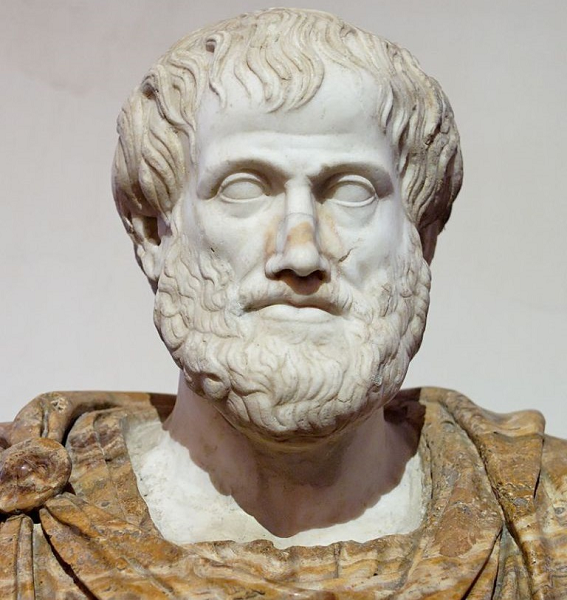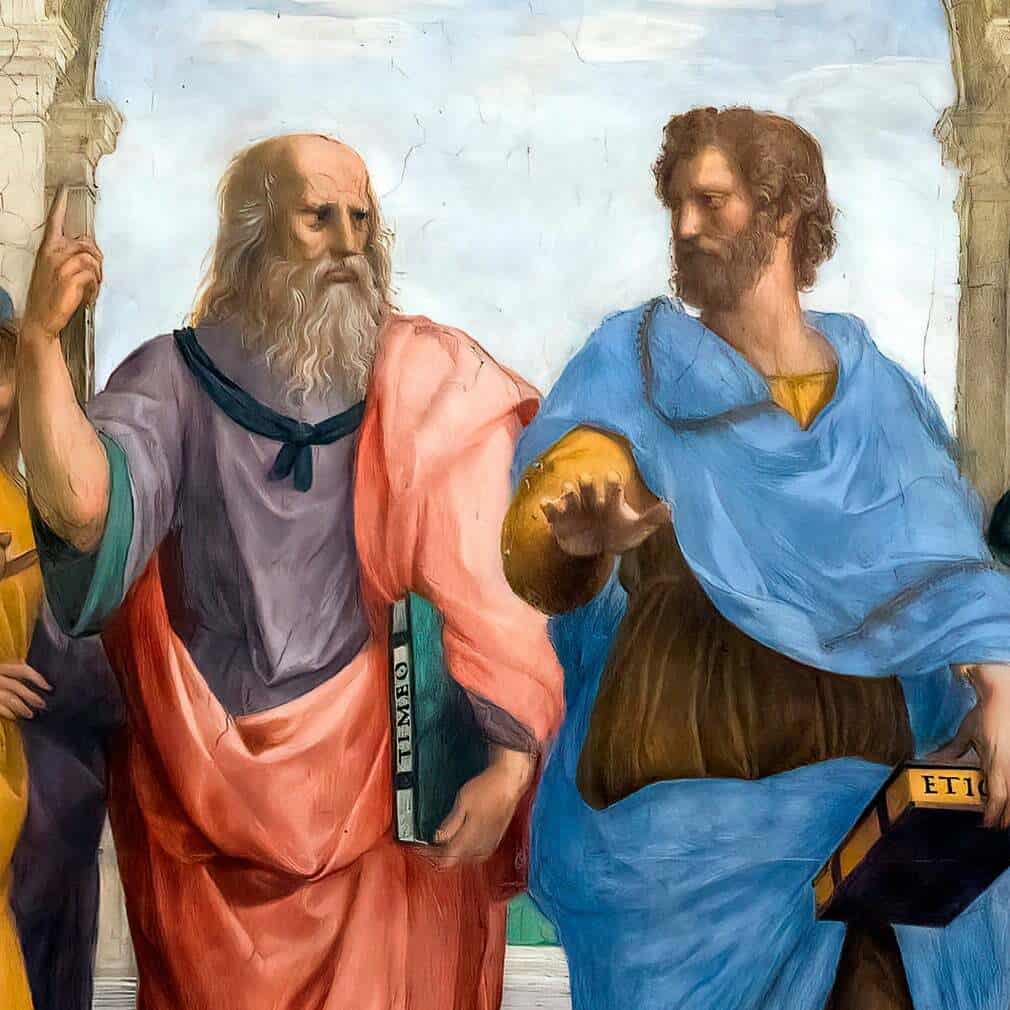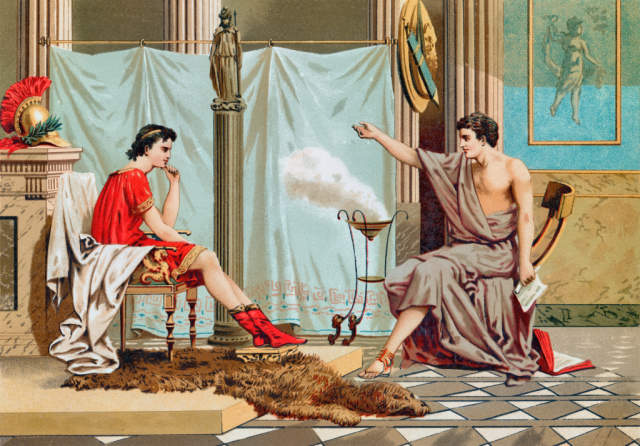
Aristote, dont la naissance remonte à 384 av. J.-C. à Stagire, une cité grecque florissante, demeure l'une des figures intellectuelles les plus imposantes de l'Antiquité, émergeant comme une force intellectuelle majeure aux côtés de son mentor, Platon. Son influence transcende les siècles, et son héritage intellectuel s'est inscrit de manière indélébile dans l'histoire de la philosophie, de la science et de la politique.

Issu d'une famille aisée, Aristote a reçu une éducation complète à Athènes, où il a rapidement attiré l'attention d'un éminent philosophe. À l'âge de 17 ans, Aristote franchit le seuil de l'Académie de Platon, un moment qui s'avère être le point de départ d'un chapitre significatif de sa vie intellectuelle. Son séjour à l'Académie, qui s'étend sur deux décennies, se révèle être une période formatrice où il absorbe le savoir prodigué par Platon. Impressionné par l'ardeur d'Aristote pour la lecture, Platon le surnomme affectueusement "le liseur". De plus, il le gratifie du surnom élogieux d'« Intelligence », soulignant ainsi sa clarté d'esprit et la profondeur de sa réflexion.
Cependant, même au sein de cette institution intellectuelle éminente, Aristote ne se laisse pas confiner par les théories des Idées de Platon. Sa soif insatiable de vérité le pousse à déclarer avec conviction : « Platon m'est cher, mais la vérité m'est encore plus chère. » Cette affirmation révèle sa détermination à poursuivre la vérité indépendamment des influences extérieures, illustrant ainsi son engagement intrinsèque envers la recherche du savoir. Malgré leur association initiale, les deux penseurs ont par la suite développé des idées divergentes qui ont contribué à façonner la pensée occidentale.

Aristote a joué un rôle crucial dans divers domaines du savoir, explorant la métaphysique, l'éthique, la politique, la biologie, la logique et la poésie. Sa vaste enquête sur la nature de la réalité et de l'existence, rassemblée dans son œuvre majeure "La Métaphysique", a jeté les bases de la philosophie métaphysique et a profondément influencé la pensée médiévale.
L'approche d'Aristote était caractérisée par son engagement envers l'observation empirique et la logique rigoureuse. Ses travaux en biologie, rassemblés dans "Histoire des animaux" et "De l'âme", témoignent de sa contribution pionnière à la compréhension scientifique du monde naturel. Ses idées politiques, exposées dans "Politique", ont également exercé une influence durable sur la philosophie politique, explorant la nature de la cité idéale et les concepts de vertu et de citoyenneté.
Le destin d'Aristote prend une nouvelle dimension lorsqu'il accepte le rôle de précepteur auprès d'Alexandre le Grand, alors âgé de seulement 13 ans. Cette position de mentor offre à Aristote une influence considérable sur le jeune prince, jouant un rôle crucial dans la formation de l'esprit du futur conquérant. Les enseignements d'Aristote, imprégnés de logique, d'éthique et de politique, marquent profondément l'éducation d'Alexandre.

De retour à Athènes, Aristote érige les fondements de son propre établissement d'enseignement, le Lycée, un lieu qui allait devenir un bastion intellectuel majeur dans l'histoire de la philosophie. À travers les portes du Lycée, Aristote introduit une perspective nouvelle selon laquelle la perception et la cognition agissent comme des fenêtres ouvertes sur le monde.
Son influence exceptionnelle sur la logique se cristallise dans son œuvre magistrale, les "Organon". À travers cette œuvre monumentale, Aristote édifie des outils conceptuels qui deviendront les piliers fondamentaux de la logique formelle, jetant ainsi les bases d'une discipline qui perdurera à travers les siècles.
Dans le domaine des mathématiques, Aristote adopte une perspective nuancée : il reconnaît que les objets mathématiques n'ont pas d'existence propre. Cependant, il attribue à ces entités abstraites une valeur précieuse en tant qu'explication de l'Univers.
La sagesse d'Aristote s'étend bien au-delà des domaines de la logique et de la métaphysique, se révélant avec éclat dans sa réflexion profonde sur l'éthique. Son magnum opus, l'influent "Éthique à Nicomaque", se dresse comme un pilier dans le panorama de la philosophie morale, offrant une exploration rigoureuse de la vertu, de la morale et des fondements d'une vie équilibrée.
Dans cette œuvre, Aristote se penche avec minutie sur la nature de la vertu, débattant des qualités qui constituent une vie morale et éthique. Il propose une vision nuancée où la vertu n'est pas simplement une action isolée, mais plutôt une habitude, une disposition caractérielle qui façonne la conduite quotidienne. La "Éthique à Nicomaque" d'Aristote propose ainsi un guide introspectif sur la manière de mener une vie éthique, soulignant l'importance de trouver un équilibre entre les extrêmes et de cultiver des habitudes vertueuses.